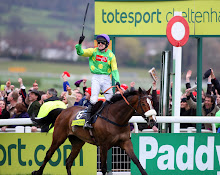
Raceday Integrity Coordinator Mark Blackman discusses the merits of 'speed mapping' and how it could be applied to British racing
ALMOST every week, it seems, the integrity services department at the BHA’s headquarters in High Holborn receives a visit from someone interested in learning more about what we do.
Our benchmark intelligence-gathering and betting analysis procedures are a lure for interested parties from all manner of other sports and jurisdictions, and many sections of the media, fascinated by the systems we have in place for keeping the sport as clean as possible, and taking the fight against corruption ever forward.
They come to learn about how we operate in racing, and leave with ideas about how our methods can be employed in their own sports.
Sometimes, of course, it can work the other way, and a visitor to our offices can engage us with details of their own operation. That’s exactly what happened when two racing integrity chiefs from Australia dropped in for an afternoon recently.
Terry Bailey, the chairman of stewards for Racing Victoria, and Brant Dunshea, general manager of integrity services for Harness Racing Victoria, provided a brief but fascinating insight into the ways in which their sports are policed and refereed. The most absorbing topic for discussion – one I could have spent hours talking to them about – was their reliance on ‘speed mapping’.
Prior to every meeting in Victoria, the stewards are given a 45-minute ‘race pace’ briefing by their equivalent of one of our handicappers. During this thorough going-over of the day’s events, they are guided by the speed mapper on precisely how they should expect each race to be run.
"No.1 breaks quickly and will lead on the rail; No. 2 likes to sit just behind the pace and will track No. 1 on the rail; No. 3 is always held up towards the rear; No. 4 breaks fast and should track over the two-path...." and so on and so on, for every horse in every race.
That level of briefing does not take place in Britain, and to be fair, with the volume of racing that is centrally governed here, it would require a huge investment in resources to do it.
Armed with this depth of pace expectation, the stewards in Australia know exactly where each runner should be in the early stages of their race if its chance is to be maximised, on all known evidence. If the race does not pan out as expected, then be in no doubt, the stewards WILL ask questions of those who don’t play the game as expected – although, as Dunshea pointed out, “they’re horses, not slot cars”, and the stewards are experienced enough to take account of that.
Furthermore, if any connections plan to change their tactics for a particular race – for example, they intend to hold up a horse that usually front-runs, whether for tactical reasons of because of the barrier draw – they are required by the rules to inform the stewards beforehand.
I wonder what trainers here would make of that. If the tactics are wildly different and they haven’t informed the stewards, or if they report a change of tactics but don’t then implement them, they can again expect to be asked some pretty searching questions.
In an ideal world, it would be wonderful to be able to brief the raceday stewards with this sort of speed mapping in Britain. There are a number of barriers that would need to be overcome, but so there were in Victoria when stricter rules were brought in five years ago governing changes in tactics.
Trainers initially went volcanic when they were told they would be required to inform the stewards of their intentions, but now that it is woven into the fabric of the sport there, it reportedly works well and has made the sport more transparent for the stewards and punters alike.
The volume of racing and the resources that would be required to cover it are the main reasons why ‘speed mapping’ briefings are a long way off in Britain, but there is no reason why the principals cannot be applied a lot more often.
To my mind, when a jockey rides a horse a different way from what we have all come to expect, regardless of how hard he or she has tried during the race, there’s no reason why we can’t ask a simple question of them: “Why did you ride the horse that way today?” Most of the time, I’m sure, their answer will provide an acceptable explanation, and surely that’s more informative for everyone than not to ask a question at all?


No comments:
Post a Comment